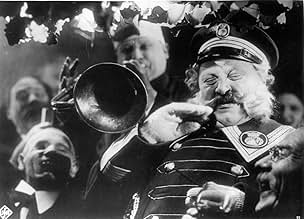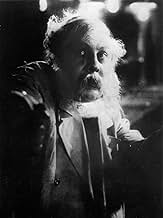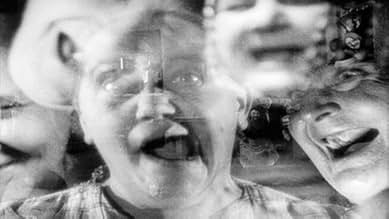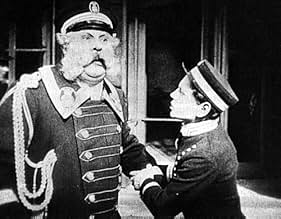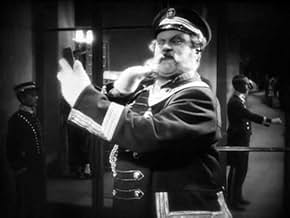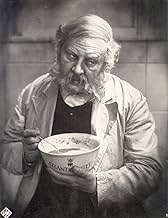AVALIAÇÃO DA IMDb
8,0/10
16 mil
SUA AVALIAÇÃO
O porteiro de um luxuoso hotel enfrenta as consequências de envelhecer e o escárnio dos vizinhos e da sociedade após ser demitido da prestigiada função.O porteiro de um luxuoso hotel enfrenta as consequências de envelhecer e o escárnio dos vizinhos e da sociedade após ser demitido da prestigiada função.O porteiro de um luxuoso hotel enfrenta as consequências de envelhecer e o escárnio dos vizinhos e da sociedade após ser demitido da prestigiada função.
- Direção
- Roteirista
- Artistas
- Prêmios
- 2 vitórias no total
O.E. Hasse
- Small Role
- (não creditado)
Harald Madsen
- Wedding Musician
- (não creditado)
Neumann-Schüler
- Small Role
- (não creditado)
Carl Schenstrøm
- Wedding Musician
- (não creditado)
Erich Schönfelder
- Small role
- (não creditado)
Enredo
Você sabia?
- CuriosidadesThe first "dolly" (a device that allows a camera to move during a shot) was created for this film. According to Edgar G. Ulmer, who worked on the film, the idea to make the first dolly came from the desire to focus on Emil Jannings' face during the first shot of the movie, as he moved through the hotel. They obviously didn't know how to make a dolly technically, so they created the first one out of a baby's carriage. They then pulled the carriage on a sort of railway that was built in the studio.
- Erros de gravaçãoWhen the porter comes home with the stolen coat, the third button down (which fell off earlier) is still there until a close-up of him at the door.
- Versões alternativasThere is an Italian edition of this film on DVD, re-edited in double version (1.33:1 and 1.78:1) with the contribution of film historian Riccardo Cusin. This version is also available for streaming on some platforms.
- ConexõesFeatured in Ronda Mortal (1983)
Avaliação em destaque
I just viewed this film on the pristine Kino video release, having seen a poorish print years ago.
One of the great classics of the German silent cinema, hugely influential, this true work of art not only displays the seemingly limitless resources of the UFA studios, but dares to break constantly with convention, particularly by being a "pure" film and dispensing with intertitles, but most spectacularly in its use of the "subjective" camera--creating as far as I know, the first sustained use of "point of view" in the history of movies, which had hitherto shown us action objectively, as it were: the spectator had always merely "observed," as in a third person narrative. Even Griffith and Bitzer's trucking shots, while including "us" in the action, did not represent another character's point of view. Well, after "the Last Laugh," P.O.V. turns up again and again. (See Abel Gance's "Napoleon.") Today the technique is common (necessary!). The most famous shots in "Der Letzte Mann" include the drunken swaying of the room seen through the Doorman's bleary eyes (cinematographer Karl Freund seated in a large swing and pushed back and forth); the opening shot coming down into the lobby by elevator and exiting the gate; and the astonishing vision of the hotel toppling in slow motion over on the poor doorman after his demotion. And can you believe that first night cityscape with the driving rain was all constructed and shot INDOORS?
However, I must say there is an unfortunate message in this drama, that of the merciless German stereotype: fawning before authority and deriding weakness--humiliating the powerless, admiring, almost worshiping the powerful. This is shown by the doorman's vanity and puffed-up self-image, which hinges, it seems, on a splendid uniform and the deference it alone inspires. Position is everything to him, his family, employers, hotel guests and neighbors. This is a shallow world, indeed, a social mentality that I can imagine, without straining too much, easily leading in a few brief years straight to the all-too-successful Gestapo! (I would add that the ending seems to contradict this, but the ending must be discounted; it is a sheer fantasy, "tacked on," really unrelated to the rest of the film and completely out of character.)
One of the great classics of the German silent cinema, hugely influential, this true work of art not only displays the seemingly limitless resources of the UFA studios, but dares to break constantly with convention, particularly by being a "pure" film and dispensing with intertitles, but most spectacularly in its use of the "subjective" camera--creating as far as I know, the first sustained use of "point of view" in the history of movies, which had hitherto shown us action objectively, as it were: the spectator had always merely "observed," as in a third person narrative. Even Griffith and Bitzer's trucking shots, while including "us" in the action, did not represent another character's point of view. Well, after "the Last Laugh," P.O.V. turns up again and again. (See Abel Gance's "Napoleon.") Today the technique is common (necessary!). The most famous shots in "Der Letzte Mann" include the drunken swaying of the room seen through the Doorman's bleary eyes (cinematographer Karl Freund seated in a large swing and pushed back and forth); the opening shot coming down into the lobby by elevator and exiting the gate; and the astonishing vision of the hotel toppling in slow motion over on the poor doorman after his demotion. And can you believe that first night cityscape with the driving rain was all constructed and shot INDOORS?
However, I must say there is an unfortunate message in this drama, that of the merciless German stereotype: fawning before authority and deriding weakness--humiliating the powerless, admiring, almost worshiping the powerful. This is shown by the doorman's vanity and puffed-up self-image, which hinges, it seems, on a splendid uniform and the deference it alone inspires. Position is everything to him, his family, employers, hotel guests and neighbors. This is a shallow world, indeed, a social mentality that I can imagine, without straining too much, easily leading in a few brief years straight to the all-too-successful Gestapo! (I would add that the ending seems to contradict this, but the ending must be discounted; it is a sheer fantasy, "tacked on," really unrelated to the rest of the film and completely out of character.)
- Doug-193
- 10 de nov. de 1999
- Link permanente
Principais escolhas
Faça login para avaliar e ver a lista de recomendações personalizadas
- How long is The Last Laugh?Fornecido pela Alexa
Detalhes
Bilheteria
- Faturamento bruto nos EUA e Canadá
- US$ 94.812
- Tempo de duração1 hora 28 minutos
- Cor
- Mixagem de som
- Proporção
- 1.33 : 1
Contribua para esta página
Sugerir uma alteração ou adicionar conteúdo ausente


